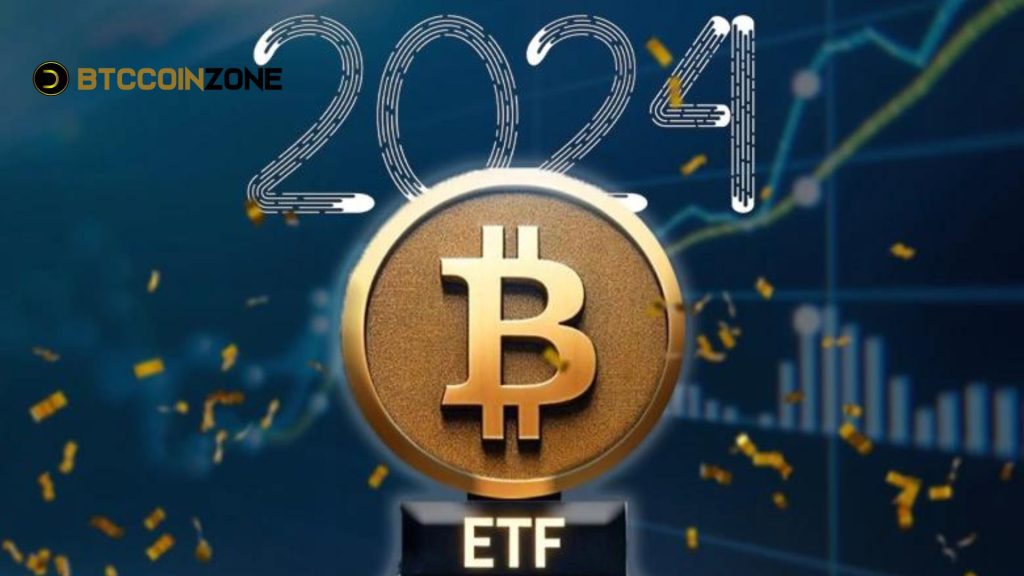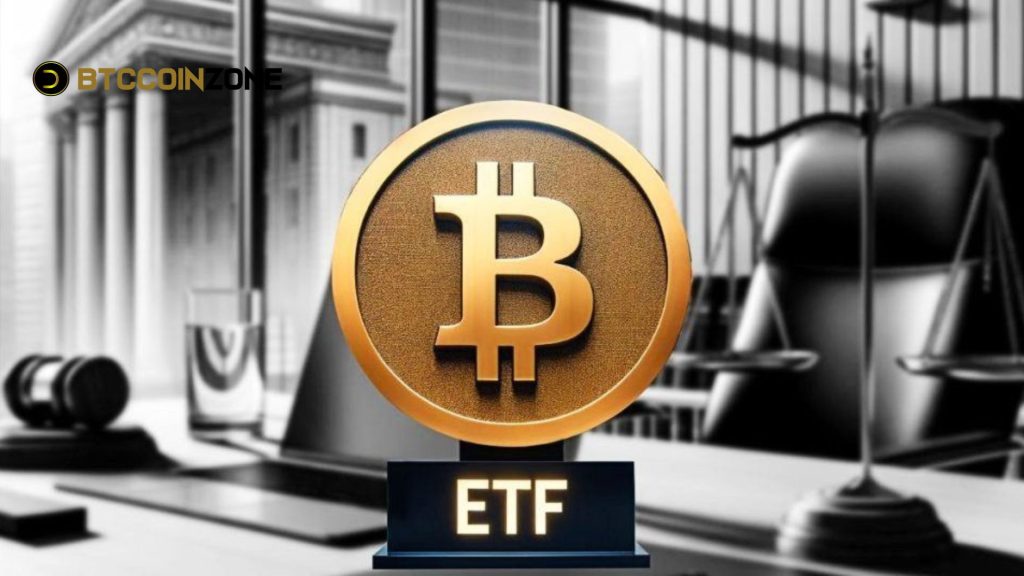Bitcoin ETF Adoption New Cryptocurrency Investment Era

Bitcoin ETF Adoption A significant step forward in developing cryptocurrency investment was introducing Bitcoin exchange-traded funds (ETFs). Bitcoin ETFs provide a regulated, easily accessible way for investors to get exposure to Bitcoin without the hassle of direct ownership, as digital assets are being more recognized and integrated into regular financial markets. In this in-depth article, learn about Bitcoin ETFs, how they work, what they mean for the cryptocurrency market, and the future of investing in digital assets.
Defining Bitcoin ETF
An exchange-traded fund (ETF) that invests in Bitcoin and trades on a regular stock exchange follows the price of Bitcoin. By purchasing shares in the fund, investors can gain exposure to Bitcoin’s price fluctuations without owning the cryptocurrency. There are other possible designs for a Bitcoin ETF, such as:
- Physically Backed ETF: This type of ETF holds actual Bitcoin in a secure custody solution. The value of each share in the ETF is directly linked to the price of Bitcoin, making it a pure play on the cryptocurrency’s performance.
- Futures-Based ETF: Instead of holding actual Bitcoin, a futures-based ETF invests in Bitcoin futures contracts. This approach allows the fund to gain exposure to Bitcoin’s price movements through regulated futures markets.
- Indirect Exposure ETF: Some ETFs may invest in companies heavily involved in the Bitcoin ecosystem, such as miners or businesses that utilize Bitcoin in their operations. While these do not provide direct exposure to Bitcoin, they can offer a correlated investment opportunity.
The Rise of Bitcoin ETFs
Since Bitcoin’s rise to prominence, Bitcoin exchange-traded funds (ETFs) have been in the works. Still, their adoption has been stalled in numerous jurisdictions due to regulatory roadblocks and worries about market manipulation. On the other hand, things have changed a lot recently. Bitcoin ETF Adoption For instance, numerous Bitcoin ETFs have been launched in the US due to the growing openness of the Securities and Exchange Commission (SEC) to such applications.

October 2021 marked a watershed event for cryptocurrency investment in the US as the ProShares Bitcoin Strategy ETF, the first Bitcoin futures ETF, was introduced. This ETF’s green light indicates that Bitcoin is becoming more popular in the financial sector, which should encourage more of them to join the market.
Factors Driving Bitcoin ETF Adoption
Bitcoin ETFs are popular for several reasons. First, institutional cryptocurrency investors have chosen regulated investment vehicles like Bitcoin ETFs, which provide exposure without ownership. Bitcoin’s financial credibility drives institutional demand. Second, financial regulators globally realize the need for structured products, giving Bitcoin ETFs regulatory assurance. Retail investors utilizing brokerage accounts can easily buy Bitcoin ETFs.Bitcoin ETFs diversify portfolios with crypto, increasing earnings and minimizing risk. These factors increase Bitcoin ETF adoption.
Institutional Interest
Bitcoin on the Base Price and other cryptocurrencies have attracted the attention of institutional investors, including asset managers and hedge funds. Now that Bitcoin ETFs are available, these institutions may invest in Bitcoin using familiar vehicles, simplifying capital allocation to digital assets. Traditional investors now see Bitcoin as a legitimate investment option because of these institutions’ support.
Regulatory Clarity
The approval of Bitcoin ETFs shows a more defined route for investing in digital assets, which is essential given the ongoing evolution of regulatory frameworks about cryptocurrencies. Thanks to regulators’ recognition of the need for Bitcoin-related products and the adoption of standards for functioning exchange-traded funds (ETFs), investors no longer face as much ambiguity.
Increased Accessibility
One convenient option for regular people to invest in Bitcoin is through exchange-traded funds (ETFs). Traditional exchanges’ complexity and security risks could be too much for first-time cryptocurrency investors. Bitcoin exchange-traded funds remove these obstacles, letting investors purchase shares using their preexisting brokerage accounts.
Diversification Opportunities
Alternative assets are attracting more investors as a means of portfolio diversification. Investors can diversify their portfolios using Bitcoin ETFs, which give them access to digital assets that may outperform more traditional asset classes while reducing their risk exposure.
Implications of Bitcoin ETF Adoption
Bitcoin ETFs impact cryptocurrency investors and markets. First, institutional engagement legitimizes Bitcoin as a mainstream asset and may increase investment. Market liquidity and stability may also increase. Bitcoin ETFs let ordinary people invest in Bitcoin through brokerage accounts without managing digital wallets or private keys, which may boost cryptocurrency adoption. Regulated Bitcoin ETFs may safeguard investors by strengthening regulations. Bitcoin ETF adoption may alter how traditional financial markets integrate cryptocurrency.
Market Legitimization
Introducing Bitcoin ETFs helps legitimize the cryptocurrency market, fostering greater confidence among institutional and retail investors. As Bitcoin becomes more integrated into traditional financial markets, it will likely attract more significant investment and enhance its reputation as a legitimate asset class.
Increased Volatility
While Bitcoin ETFs can stabilize the market by attracting institutional investment, they may also contribute to increased volatility. As ETFs become more popular, large capital inflows and outflows can lead to rapid price fluctuations in the underlying asset, affecting the overall market.
Influence on Bitcoin Prices
The approval and success of Bitcoin ETFs can profoundly impact Bitcoin prices. Their positive performance may drive demand for Bitcoin, potentially leading to price appreciation. Conversely, negative performance or regulatory issues related to ETFs could adversely affect Bitcoin prices.
Expansion of Investment Products
The rise of Bitcoin ETFs has spurred interest in developing a broader range of cryptocurrency-related investment products. This includes ETFs that track other cryptocurrencies, blockchain technology companies, and digital asset investment strategies. Such innovation could lead to a more diversified investment landscape within the cryptocurrency sector.
Regulatory Risks
Regulators continue to closely watch Bitcoin ETFs. Authorities are still trying to figure out how to monitor the Bitcoin market, and their future moves could affect both established and emerging ETFs.
- Market Manipulation: Concerns about market manipulation have been a significant barrier to approving Bitcoin ETFs. Regulators must ensure that the market operates fairly and transparently, which is particularly challenging in the relatively nascent cryptocurrency space.
- Custodial Risks: For physically-backed Bitcoin ETFs, custodial risks arise from the need to store the actual Bitcoin securely. Ensuring the safety of digital assets is paramount, and any breaches or losses could undermine investor confidence.
- Educational Gaps: Many potential investors still lack a deep understanding of Bitcoin and cryptocurrencies. Educating the public about the nature of Bitcoin ETFs and the underlying risks is essential to ensure informed investment decisions.
Future of Bitcoin ETFs
Bitcoin ETFs have a bright future as the cryptocurrency industry keeps improving. Regulatory clarity and growing institutional support for Bitcoin could lead to the launch of additional exchange-traded funds (ETFs), giving investors a wider range of opportunities to participate in digital assets.

Innovations in financial products and developments in blockchain technology are also expected to spur the creation of fresh and intriguing cryptocurrency investment options. Bitcoin ETF Adoption Retail and institutional investors may look to Bitcoin exchange-traded funds (ETFs) to influence their investment strategies.
In Summary
An essential step toward mainstreaming Bitcoin into the financial sector is the acceptance of Bitcoin ETFs. Investors can participate in the digital asset revolution using Bitcoin ETFs, regulated and easily accessible investment vehicles. This allows them to avoid some of the dangers and complications of owning cryptocurrencies directly. However, there will be far-reaching effects on the Bitcoin market, conventional banking, and investment tactics as usage increases. Investing in Bitcoin ETFs is bright, and they have a promising future.



